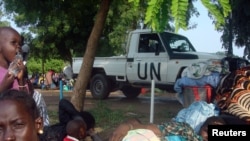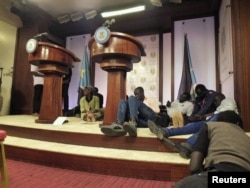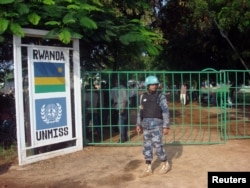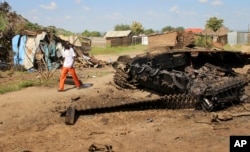An independent investigation into July's deadly clashes in South Sudan's capital has concluded that U.N. military and mission personnel failed to protect civilians and aid workers.
The investigation, headed by retired Dutch General Patrick Cammaert, found that "a lack of leadership on the part of key senior mission personnel culminated in a chaotic and ineffective response to the violence," according to investigators.
A U.N. spokesman said Secretary-General Ban Ki-moon has asked for the force commander of the U.N. mission in South Sudan to be replaced.
"That is one of the recommendations that will be implemented immediately. Others will be announced in due course," Stephane Dujarric told reporters.
The commander, Lieutenant General Johnson Mogoa Kimani Ondieki, was appointed by the secretary-general in May of this year.
Peacekeepers criticized
The fighting between government soldiers supporting President Salva Kiir and troops loyal to opposition leader Riek Machar erupted July 8 near the presidential palace. Some estimates say more than 300 people were killed. The clashes also led to attacks, rapes, looting and other atrocities on the local population, many of whom were singled out for their ethnicity.
The United Nations has nearly 14,000 soldiers and police in South Sudan in its mission, known as UNMISS. In Juba, during the days in July the commission investigated, there were troops operating from China, Ethiopia, Nepal and India.
In the 10-page executive summary, which is the only part of the report that the United Nations has released, the investigators singled out a Chinese battalion for at least twice abandoning its position at a protection-of-civilians camp site, and criticized a Nepalese police unit for failing to stop looting inside the U.N. headquarters building.
The peacekeepers were also generally criticized for having a "risk-averse posture unsuited to protecting civilians from sexual violence and other opportunistic attacks" and for not regularly patrolling outside their perimeter at night.
UNMISS troops also failed to protect a World Food Program compound and warehouse, which led to the looting of $29 million in food, equipment and other supplies that month, according to the investigators.
Government troops
Rights groups and witnesses have accused South Sudanese government troops of having perpetrated of much of the violence, including raping women and aid workers.
The investigators found government soldiers "perpetrated the attack on Terrain camp" about a kilometer outside of Juba, where some 70 civilians — including foreign aid workers — were at the time.
The investigators said the government did not dispute the charge during a September meeting with their team.
Several hours into the attack on the Terrain compound, national security service officers helped get most of the civilians out of the camp, but three female NGO workers were left behind. They called the U.N. mission for assistance, but none came and they remained overnight at the camp and were not rescued until the following morning when an NGO sent private security contractors to extract them.
Recommendations
The investigators recommend that the U.N. further investigate the peacekeepers' shortcomings and hold accountable relevant actors for their failures to protect.
They also urge common sense measures, such as making sure key military and staff all have a working knowledge of English, have rigorous contingency plans in place, understand their mission mandate and rules of engagement, and receive training on sexual violence.
The U.N. chief spokesman says Ban is "deeply distressed by these findings" and will implement the investigators' recommendations. He said Ban is "alarmed by the serious shortcomings identified by the special investigation, which were evident in the mission's failure to fully implement its mandate to protect civilians and U.N. staff during the fighting."
Ban appointed Cammaert in August to lead an independent special investigation into the violence in Juba and the response of the U.N. mission.







